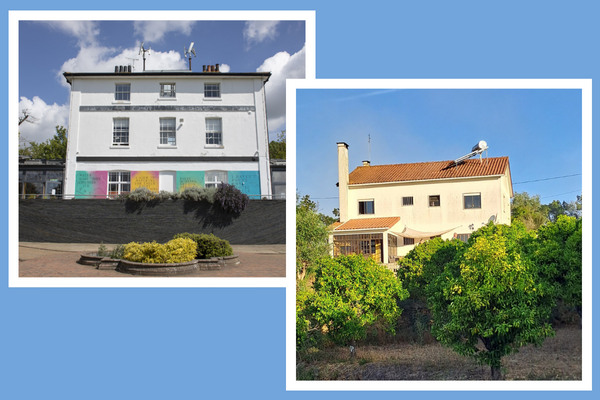
By Ros Green, 07 September 2023
Seven years ago, Syd Moore, Writer and Founder of Essex Girls Liberation Front, Colette Bailey, then Artistic Director and Chief Executive of Metal Culture, now WOW’s [Women of the World Foundation] Executive Director, and myself sat around The Water Table in Chalkwell Hall, Metal’s Southend-on-Sea basecamp, brainstorming ideas for the next Essex Book Festival.
We discussed collaborating on a series of writer workshops for new and emerging local writers; hosting writers’ events and poetry slams; coffee mornings and book clubs; running international residencies in partnership with other organisations: English PEN, Index on Censorship and the British Council were quickly in the mix for that one.
We chatted about what writers need to write. The issues they face in terms of carving out time and a space to write. Particularly women with young children. What constitutes a writer. The challenges of imposter syndrome. How everyone has a story, if not an epic 800-page novel, within them, and how they should be supported and encouraged to tell it. The idea of a creating a new writing community… A house for writers… A writers house. Until finally, we ‘dropped anchor’ at the Essex Writers House.
The conversation spilt over into a follow-up meeting with Sarah Perry, Essex Book Festival Patron and award-winning writer, now Chancellor of University of Essex, and Chris Gribble, then Founder and Chief Executive of National Writers Centre, now Chief Executive of The Forum in Norwich. It wavered between a ‘bricks and mortar’ dedicated building with real coffee, desks and bookshelves, to an online digital space with a live-chatroom and a well-stocked, regularly updated database of agents and publishers. Both options containing everything a writer needs to get going and get published.
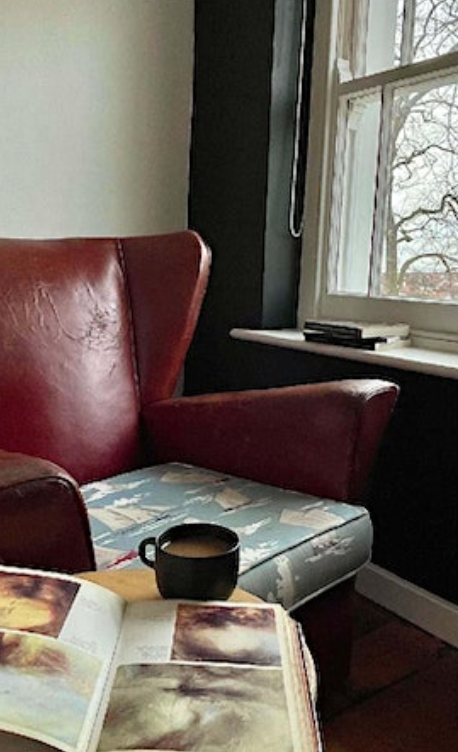
The Elephant in the Room – money – quickly made its presence felt with a deafening trumpet. Where are we going to find the money for a ‘bricks and mortar’ writers’ house, and where will we build it? Harlow, Chelmsford, Colchester, Southend, Thurrock, Maldon, Brentwood, Saffron Walden? Essex is a big county. One of the biggest in the land. A website, on the other hand, would be easy to fund and maintain, and accessible to everyone. At least for those with access to the Internet, Syd interjected. The momentum swiftly leant towards the latter. The thinking being that it’s always better to do something, than expend a lot of time and energy on something that most likely won’t happen. Common sense prevailed. The Elephant nodded approvingly.
As soon as Sarah and Chris left, however, it quickly started to swing back the other way. So much so that we decided to throw the Elephant out of the room and focus on what we really wanted for Essex: a ‘bricks and mortar’ Writers House.
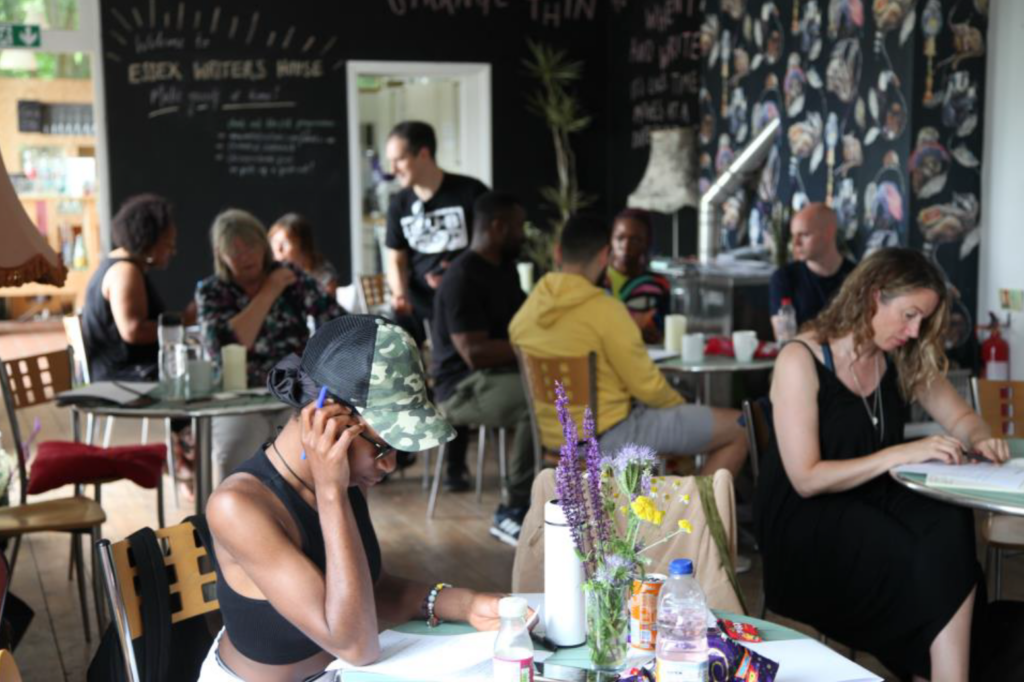
It doesn’t have to be a big house, we agreed, but it does have to have real-life walls and windows, chairs and tables, books and coffee mugs, the odd bed or two if possible, and a view to write for. Somewhere for people to write, to chat, to drink coffee and wine, to share their work. Most importantly, somewhere for writers to gather. Something along the lines of The Red House of Culture and Debate in Sofia, Syd suggested. Or The Writers House in Tallinn, I added, having just returned from HeadRead Literary Festival in Estonia.
We went round and round in circles trying to conjure our dream house, while actively blanking the banished Elephant and its endless rude gestures through the window. It’s not that we didn’t have enough money to build a house or to renovate an existing building, it’s just that we had zero money and no palpable means of getting any for a project on this scale.
Then Colette had a brainwave. Of course, she did. Perhaps we were already sitting in it, she said. Syd and me were suddenly all ears. Even the Elephant lifted an enormous ear to the window. Ignoring the Elephant, Colette continued. We could turn Chalkwell Hall into a pop-up Essex Writers House for the duration of the festival. It’s got everything on the ‘House’ wish-list, including two lovely bedrooms to host our international writers’ residencies, and a spectacular view over the Thames Estuary.
Bingo. We were in and the Elephant was out. At least for now.
More Than A House, A Family
Anyone who has spent any time at Chalkwell Hall will know that it is so much more than just a House. It is a Mecca for creativity.
Take The Water Table: an innovative collaborative project between Southend Parks Team, Metal and Essex and Suffolk Water, which formed part of a drought-resistant garden for Hampton Court Flower Show, and which remains the ‘chief-gathering’ point for all of our Writers House brain-storms. Needless to say, it won GOLD.
The central feature of The Water Table is the brassica, which carries along its many veins the names of all of the people and tributaries who have been instrumental in engineering and water. This includes Joseph Bazalgette, the brain behind a sewerage system for Central London that radically reduced the city’s cholera epidemics, and took The Great Stink of 1858 to task too. Add to that the spade hidden underneath the table that marks all of the people who actually dug the drains but went unnamed and unrecognised for their work, and you will start to get a feel for what Metal is about.
That’s The Water Table covered, next up Metal Culture, one of the most intriguingly dynamic and nurturing cultural organisations I have had the pleasure to work with.
Founded in 2002 by Jude Kelly CBE, Metal has been active in Liverpool since 2004, in Southend-on-Sea since 2007 and in Peterborough since 2012. In each place, it works from buildings of historic significance which it has transformed from an empty or derelict space into a vibrant cultural community hub.
Metal believes that everyone deserves a rich, cultural life, and that where people live should not be a barrier to this. It creates time and space for artists of all ages and backgrounds to forge new ideas and realise their potential, while celebrating places, building local connections, and encouraging experimentation, collaboration and co-creation.
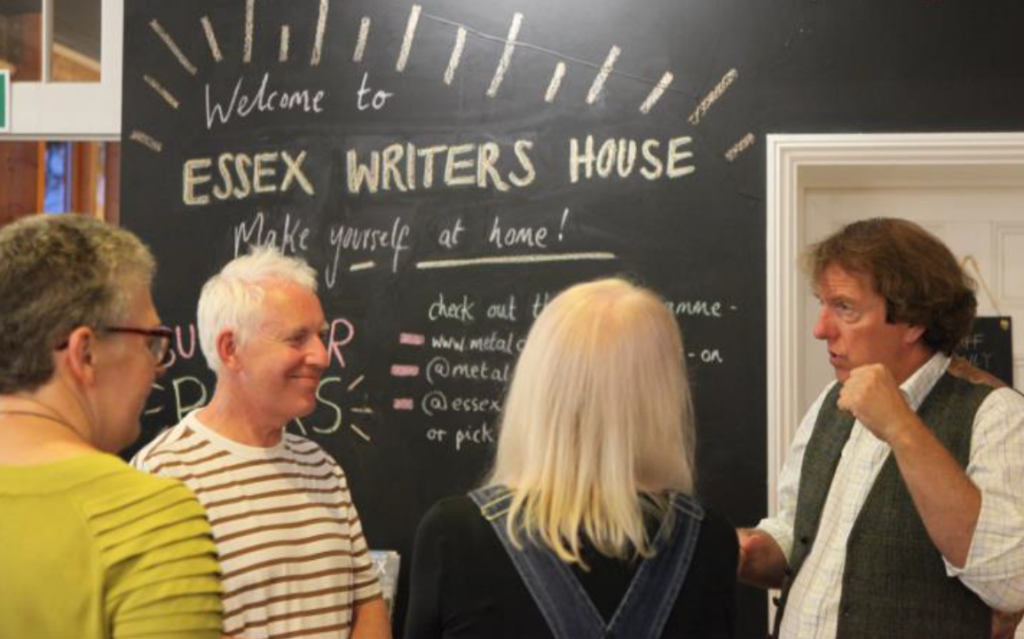
While I can’t speak for its ‘sister’ buildings in Peterborough and Liverpool, I do feel qualified to talk about the Chalkwell Hall ‘experience’. Whenever I cross its threshold, I have this overwhelming sense of coming home. Of putting down my bag, and everything else, be it a half-finished funding application or roadworks on the A13, simply fading away. Time stops, and the important stuff, the excellent conversations and invigorating brief encounters, the catching up with old friends and making new friends – the family stuff – begins. Because unlike any other cultural organisation I know, Metal is a family and Chalkwell Hall is a home.
That’s not to say Andrea, Paige, Hannah and the rest of the Metal team aren’t hard at it running a busy cultural centre, they certainly are, but rather it’s the way they do it. The time and space that is dedicated to artists and curators, workshop participants, and anyone else who happens to be there on any one day. The care and respect they show to everyone. The nurturing. Which is why Chalkwell Hall is the perfect place to host the annual Essex Writers House.
A Place for Writers
Looking back over the last seven years, firstly, I can’t believe how quickly they have passed, and secondly, the sheer volume of things that have taken place under the auspices of Essex Writers House, both in Chalkwell Hall and other related venues.
Who knew that we would be hosting our first radical silent disco in The Commander’s Room in Kelvedon Hatch Secret Nuclear Bunker as part of Estonian poet Pavvo Matsin’s international writing residency at Metal? Or hosting the first stage of our Radical Pilgrimage along The Saffron Trail from Southend to Saffron Walden at Chalkwell Hall led by British Egyptian writer and artist Lora Aziz? And, that aside from Lora, we would be hosting three other international writers in the House this year: Polish writers Majiec Hen and Wioletta Greg whose residencies were supported by the Polish Cultural Institute, and Pakistani blogger Nawaziest-Ul-Bushra, who is currently based at the University of Essex.
Meanwhile, the free Writers Hot Desks in the Attic Studio have literally become ‘hot desks’ as writers at all stages of their career now rush to nab one as soon as they go online. Why not take advantage of that spectacular view over the Thames Estuary? We knew they’d like it. Then there are the workshops, all free, and all fascinating in their own way.
This year we had Placemaking Poetics, a walking workshop exploring place-based writing through techniques such as concrete poetry, psychogeography and mark-making. We also have live author events with a special focus on local writers.
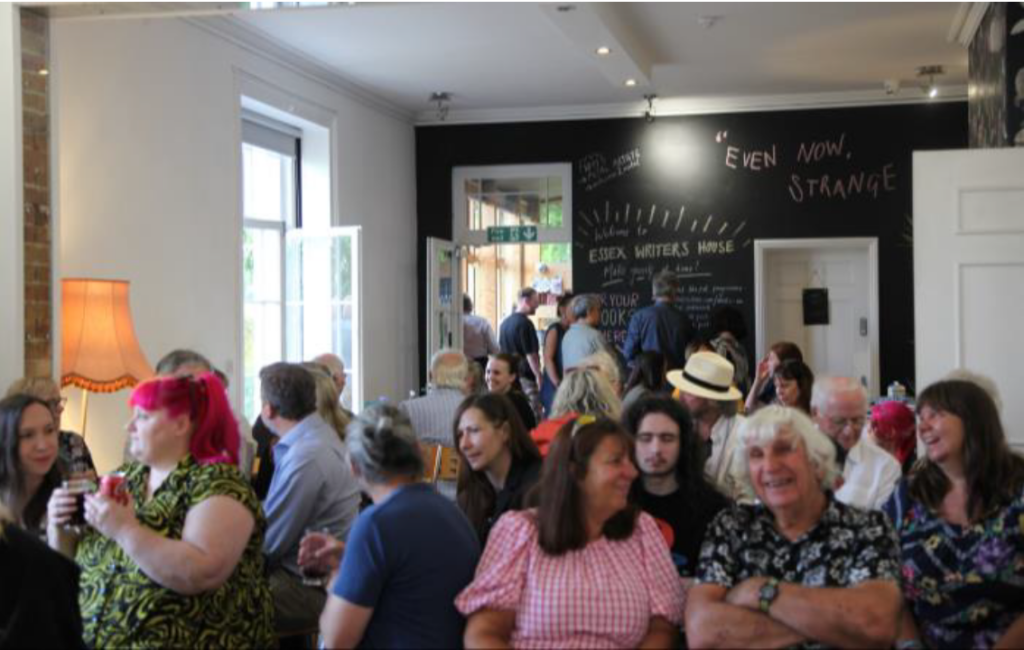
We were thrilled to welcome Essex writer and author Rose Cleary to come to the Writers House in June to talk about her debut novel How to be a French Girl, and to host our first Lucky Dip, a writers’ social with a twist and secret guest where writers could come along and meet new people, share notes and be entertained. The list goes on and on, and will continue to grow and evolve.
I am writing this from my lofty perch in Studio 459, a beautiful white house in Portugal set in a garden of orange and lemon trees surrounded by olive groves, which fauna aside, bears more than a passing resemblance to Chalkwell Hall, both in terms of the look of the place, and also its creative ethos.
Metal has teamed up with its wonderful owners Mark and Joao to support artist residencies for members of the extended Metal ‘family’ – those have taken part in Metal residencies over the last twenty years. I for one am honoured to have been invited to savour the experience and hospitality, and feel sure that this marks a new stage of Essex Writers House.
Quite how, or what form it will take, has yet to be revealed. Of one thing I am certain, the Elephant will not be entering this room.
Main photo: Chalkwell Hall in Southend by Mark Massey and Studio 459 in Portugal


